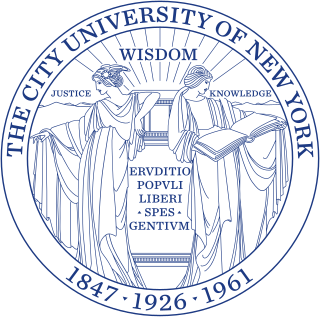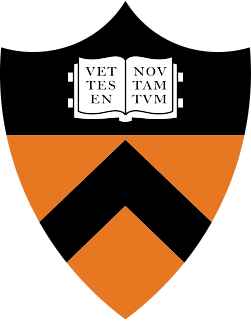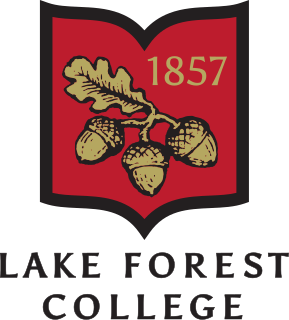Related Research Articles

Barnard College of Columbia University is a private women's liberal arts college in New York City. It was founded in 1889 by Annie Nathan Meyer as a response to Columbia University's refusal to admit women and is named after Columbia's 10th president, Frederick Barnard.

The City University of New York is the public university system of New York City. It is the largest urban university system in the United States, comprising 25 campuses: eleven senior colleges, seven community colleges and seven professional institutions. While its constituent colleges date back as far as 1847, CUNY was established in 1961. The university enrolls more than 275,000 students, and counts thirteen Nobel Prize winners and twenty-four MacArthur Fellows among its alumni.

Harvey Mudd College (HMC) is a private college in Claremont, California, focused on science and engineering. It is part of the Claremont Colleges, which share adjoining campus grounds and resources. The college enrolls 902 undergraduate students as of 2021, and awards the Bachelor of Science degree.

Princeton University is a private Ivy League research university in Princeton, New Jersey. Founded in 1746 in Elizabeth as the College of New Jersey, Princeton is the fourth-oldest institution of higher education in the United States and one of the nine colonial colleges chartered before the American Revolution. The institution moved to Newark in 1747, and then to the current site nine years later. It officially became a university in 1896 and was subsequently renamed Princeton University.

The University of California (UC) is a public land-grant research university system in the U.S. state of California. The system is composed of the campuses at Berkeley, Davis, Irvine, Los Angeles, Merced, Riverside, San Diego, San Francisco, Santa Barbara, and Santa Cruz, along with numerous research centers and academic abroad centers. The system is the state's land-grant university.

Washington University in St. Louis is a private research university in Greater St. Louis with its main campus (Danforth) mostly in unincorporated St. Louis County, Missouri, and Clayton, Missouri. It also has a West Campus in Clayton, North Campus in the West End neighborhood of St. Louis, and Medical Campus in the Central West End neighborhood of St. Louis.

Swarthmore College is a private liberal arts college in Swarthmore, Pennsylvania. Founded in 1864, with its first classes held in 1869, Swarthmore is one of the earliest coeducational colleges in the United States. It was established as a college "under the care of Friends, [and] at which an education may be obtained equal to that of the best institutions of learning in our country." By 1906, Swarthmore had dropped its religious affiliation and officially became non-sectarian.

The Claremont Colleges are a consortium of seven private institutions of higher education located in Claremont, California, United States. They comprise five undergraduate colleges —Pomona College, Scripps College, Claremont McKenna College (CMC), Harvey Mudd College, and Pitzer College—and two graduate schools—Claremont Graduate University (CGU) and Keck Graduate Institute (KGI). All of the members except KGI have adjoining campuses that together cover roughly 1 square mile (2.6 km2).

Pomona College is a private liberal arts college in Claremont, California. It was established in 1887 by a group of Congregationalists who wanted to recreate a "college of the New England type" in Southern California, and in 1925 it became the founding member of the Claremont Colleges consortium of adjacent, affiliated institutions.
U.S. News & World Report is an American media company that publishes news, consumer advice, rankings, and analysis. It was launched in 1948 as the merger of domestic-focused weekly newspaper U.S. News and international-focused weekly magazine World Report. In 1995, the company launched 'usnews.com' and in 2010, the magazine ceased printing.

Scripps College is a private liberal arts women's college in Claremont, California. It was founded as a member of the Claremont Colleges in 1926, a year after the consortium's formation. Journalist and philanthropist Ellen Browning Scripps provided its initial endowment.
College admissions in the United States refers to the process of applying for entrance to institutions of higher education for undergraduate study at one of the nation's colleges or universities. For those who intend to attend college immediately after high school, the college search usually begins in the eleventh grade with most activity taking place during the twelfth grade, although students at top high schools often begin the process during their tenth grade or earlier. In addition, there are considerable numbers of students who transfer from one college to another, as well as adults older than high school age who apply to college.

The Gatekeepers: Inside the Admissions Process of a Premier College is a 2002 nonfiction book, written by education reporter Jacques Steinberg, that examines the inner workings of the admissions committee at Wesleyan University. The book expands upon a series of articles Steinberg wrote in The New York Times. Steinberg follows six college applicants through the admissions process. The book covers issues such as affirmative action, recruiting, standardized testing and the significance of the SATs.
The New York University Leonard N. Stern School of Business is the business school of New York University, a private research university based in New York City. Founded in 1900, Stern is one of the oldest and most prestigious business schools in the world. It is located on Gould Plaza next to the Courant Institute of Mathematical Sciences and the economics department of the College of Arts and Sciences.

Lake Forest College is a private liberal arts college in Lake Forest, Illinois. Founded in 1857 as Lind University by a group of Presbyterian ministers, the college has been coeducational since 1876 and an undergraduate-focused liberal arts institution since 1903. Lake Forest enrolls approximately 1,500 students representing 43 states and 80 countries. Lake Forest offers 32 undergraduate major and minor programs in the humanities, social sciences, and natural sciences, and features programs of study in pre-law, pre-medicine, communication, business, finance, and computer science. The majority of students live on the college's wooded 107-acre campus located a half-mile from the Lake Michigan shore.

Criticism of college and university rankings refers to movements which developed among faculty and administrators in American institutions of higher education as well as in Canada. The arguments of those who criticize the ranking are that it is not possible to come with a single number that characterizes university performance. Furthermore, ratings can be easily manipulated and include such subjective characteristics as the "reputation" determined by surveying university administrators such as chancellors or deans. Critics say rankings have incentivized institutions to encourage more unqualified students to apply and are a better measure of the abilities students had when they arrived than what they learned from higher education.

Harvard University is a private Ivy League research university in Cambridge, Massachusetts. Founded in 1636 as Harvard College and named for its first benefactor, the Puritan clergyman John Harvard, it is the oldest institution of higher learning in the United States and among the most prestigious in the world.
College and university rankings in the United States are rankings of U.S. colleges and universities based on factors that vary depending on the ranking. Rankings are typically conducted by magazines, newspapers, websites, or academics. The most popular and influential set of rankings is published by U.S. News & World Report. In addition to ranking entire institutions, specific programs, departments, and schools can be ranked. Some rankings consider measures of wealth, research excellence, selectivity, and alumni success. There is much debate about rankings' interpretation, accuracy, and usefulness.

The U.S. News & World Report Best Colleges Ranking is an annual set of rankings of American colleges and universities published by U.S. News & World Report beginning in 1983. They are the most widely quoted of their kind in the United States.

Ayer Cottage was the place of first meeting of Pomona College on September 12, 1888 in Pomona, California in Los Angeles County. It was designated a California Historic Landmark (No.289) on June 27, 1938. It was built in 1887, and in 1888 rented to the college so that classes could be held there. The cottage had five rooms, each used as classrooms. The cottage has since been demolished and is now a burger stand at about 500 S White St., although a commemorative marker on the site is present.
References
- 1 2 3 4 5 Thompson, Derek (29 September 2011). "What You Don't Get About Admissions: Q&A with College Guru Edward Fiske". The Atlantic. Retrieved 14 August 2020.
- 1 2 3 Fiske, Edward B. (15 June 2019). Fiske Guide to Colleges 2020. Sourcebooks. ISBN 978-1-4926-6494-9 . Retrieved 14 August 2020.
- ↑ "Weddings: Helen F. Ladd, Edward B. Fiske". The New York Times. 29 June 1997. Retrieved 15 August 2020.
- ↑ "Fiske Guide to Colleges". Sourcebooks. Retrieved 15 August 2020.
- 1 2 Teare, Chris. "Why College Ratings Are Better Than Rankings: A Wiser Way To A College Choice". Forbes. Retrieved 14 August 2020.
- ↑ Hess, Abigail (14 November 2017). "How to build your perfect college list, according to a Stanford-educated admissions expert". CNBC. Retrieved 15 August 2020.